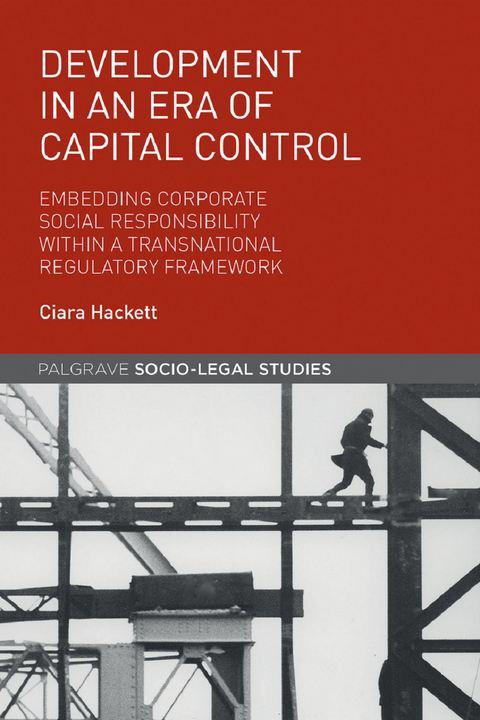
Development in an Era of Capital Control
Embedding Corporate Social Responsibility within a Transnational Regulatory Framework
Seiten
2016
|
1st ed. 2017
Palgrave Macmillan (Verlag)
978-1-137-48527-4 (ISBN)
Palgrave Macmillan (Verlag)
978-1-137-48527-4 (ISBN)
Development in an Era of Capital Control investigates Corporate Social Responsibility (CSR), a 21st century buzz word. Centred around the responsibility of business to give back to society, this idea is a departure from the traditional view that the responsibility of business is to make a profit.
Development in an Era of Capital Control investigates Corporate Social Responsibility (CSR), a 21st century buzz word. Centred around the responsibility of business to give back to society, this idea is a departure from the traditional view that the responsibility of business is to make a profit. Instead, it supposes that business, society and government can unite to enhance the quality of life in the community in which the business operates.
This book works from the premise that whereas CSR could assist in developing communities, the quality and value of this contribution is constrained by pre-existing inequalities in the global system, which themselves can be traced to states’ histories and furthered by globalisation. Ciara Hackett shows that while the concept of CSR was designed for an environment where all states are equal, this does not ring true in the real world and consequently the potential for CSR to contribute to development is restricted, most profoundly in those states that would benefit the most.
Development in an Era of Capital Control investigates Corporate Social Responsibility (CSR), a 21st century buzz word. Centred around the responsibility of business to give back to society, this idea is a departure from the traditional view that the responsibility of business is to make a profit. Instead, it supposes that business, society and government can unite to enhance the quality of life in the community in which the business operates.
This book works from the premise that whereas CSR could assist in developing communities, the quality and value of this contribution is constrained by pre-existing inequalities in the global system, which themselves can be traced to states’ histories and furthered by globalisation. Ciara Hackett shows that while the concept of CSR was designed for an environment where all states are equal, this does not ring true in the real world and consequently the potential for CSR to contribute to development is restricted, most profoundly in those states that would benefit the most.
Ciara Hackett is a Lecturer in Law at Queen's University Belfast, UK.
Preface.- Introduction.- 1. The Evolution of the CSR concept: From sharing to caring.- 2. The problem with CSR for the sake of CSR: A study in development.- 3. The Rise of Governance and the Fall of Government: Capitalism 2.0.- 4. The Changing of the Guard: Government to gatekeeper.- 5. Regulating CSR: A precursor to 'complete' globalisation.- Conclusions.- Bibliography.
| Erscheinungsdatum | 11.12.2016 |
|---|---|
| Reihe/Serie | Palgrave Socio-Legal Studies | Palgrave Socio-Legal Studies |
| Zusatzinfo | XVIII, 158 p. |
| Verlagsort | Basingstoke |
| Sprache | englisch |
| Maße | 156 x 234 mm |
| Themenwelt | Recht / Steuern ► EU / Internationales Recht |
| Recht / Steuern ► Wirtschaftsrecht ► Handelsrecht | |
| Wirtschaft ► Betriebswirtschaft / Management | |
| ISBN-10 | 1-137-48527-2 / 1137485272 |
| ISBN-13 | 978-1-137-48527-4 / 9781137485274 |
| Zustand | Neuware |
| Haben Sie eine Frage zum Produkt? |
Mehr entdecken
aus dem Bereich
aus dem Bereich
mit Einführungsgesetz, Publizitätsgesetz und …
Buch | Softcover (2024)
dtv Verlagsgesellschaft
CHF 15,25


